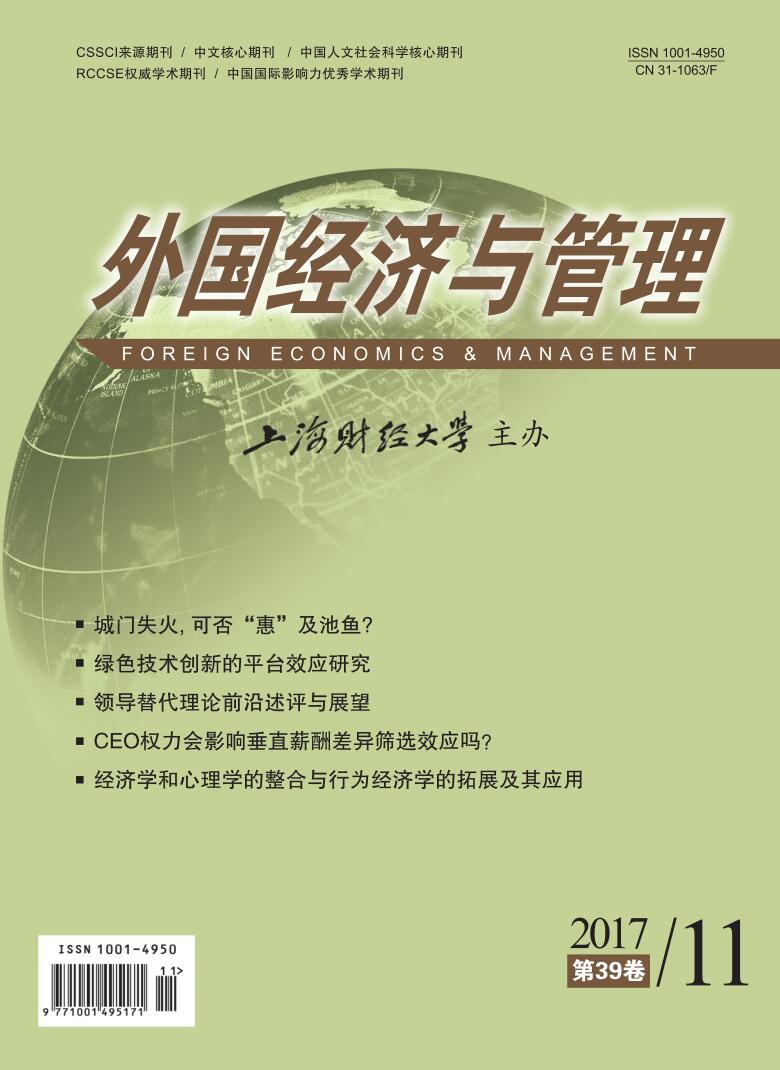理查德•塞勒因其对行为经济学的贡献而被授予2017年度诺贝尔经济学奖。本文对塞勒在经济学和心理学整合及行为经济学理论的拓展与应用方面的主要贡献做了较为系统的述评。首先,在简要概述塞勒的学术生涯及主要论著后,着重阐明塞勒在行为经济学由学术异端到主流经济学分支演变过程中所扮演的角色;其次,在概述有限理性、有限意志力和有限自利三个行为经济学基本要素的基础上,着重阐述塞勒对禀赋效应与心理账户、时间偏好的动态不一致性与自我控制、公平与社会偏好理论及应用方面的主要研究;再次,阐述塞勒在应对传统金融学质疑中对夯实有限理性和有限套利这两个行为金融学基石所做的主要贡献;最后,简要评析塞勒的理论研究特点及其理论的应用借鉴意义。
经济学和心理学的整合与行为经济学的拓展及其应用——2017年度诺贝尔经济学奖得主理查德•塞勒主要经济理论贡献述评
摘要
参考文献
1 (美)赫伯特•金迪斯, 萨缪•鲍尔斯, 浙江大学跨学科社会科学研究中心. 走向统一的社会科学[M]. 上海: 上海世纪出版集团, 2005.
2 李宝良, 郭其友. 冲突与合作经济治理的契约解决之道——2016年度诺贝尔经济学奖得主主要经济理论贡献述评[J]. 外国经济与管理, 2016, (11): 115–128.
3 (美)理查德•H•泰勒, 陈宇峰, 曲亮. 赢者的诅咒: 经济生活中的悖论与反常现象[M]. 北京: 中国人民大学出版社, 2013.
4 尼克•威尔金森, 贺京同, 那艺. 行为经济学[M]. 北京: 中国人民大学出版社, 2012.
5 Barberis N, Thaler R. A survey of behavioral finance[J]. Handbook of the Economics of Finance, 2003, 1: 1053–1128. DOI:10.1016/S1574-0102(03)01027-6
6 Benartzi S, Thaler R H. Myopic loss aversion and the equity premium puzzle[J]. The Quarterly Journal of Economics, 1995, 110(1): 73–92. DOI:10.2307/2118511
7 Benartzi S, Thaler R H. Naive diversification strategies in defined contribution saving plans[J]. The American Economic Review, 2001, 91(1): 79–98. DOI:10.1257/aer.91.1.79
8 Bertrand M, Mullainathan S, Shafir E. A behavioral-economics view of poverty[J]. The American Economic Review, 2004, 94(2): 419–423. DOI:10.1257/0002828041302019
9 Camerer C, Babcock L, Loewenstein G, Thaler R H. Labor supply of new york city cab drivers: One day at a time[J]. The Quarterly Journal of Economics, 1997, 112(2): 407–441. DOI:10.1162/003355397555244
10 De Bondt W F M, Thaler R H. Do security analysts overreact?[J]. The American Economic Review, 1990, 80(2): 52–57.
11 Jolls C, Sunstein C R, Thaler R. A behavioral approach to law and economics[J]. Stanford Law Review, 1998, 50(5): 1471–1550. Kahneman D, Knetsch J L, Thaler R H. Fairness and the assumptions of economics[J]. The Journal of Business, 1986a, 59(4): S285-S300.
12 Kahneman D, Knetsch J L, Thaler R. Fairness as a constraint on profit seeking: Entitlements in the market[J]. The American Economic Review, 1986b, 76(4): 728–741.
13 Kahneman D, Knetsch J L, Thaler R H. Experimental tests of the endowment effect and the Coase theorem[J]. Journal of Political Economy, 1990, 98(6): 1325–1348. DOI:10.1086/261737
14 Kahneman D, Tversky A. Prospect theory: an analysis of decision under risk[J]. Econometrica, 1979, 47(2): 263–291. DOI:10.2307/1914185
15 Laibson D. Golden eggs and hyperbolic discounting[J]. The Quarterly Journal of Economics, 1997, 112(2): 443–478. DOI:10.1162/003355397555253
16 Lamont O A, Thaler R H. Can the market add and subtract? Mispricing in tech stock carve-outs[J]. Journal of Political Economy, 2003, 111(2): 227–268. DOI:10.1086/367683
17 Lee C M C, Shleifer A, Thaler R H. Investor sentiment and the closed-end fund puzzle[J]. The Journal of Finance, 1991, 46(1): 75–109. DOI:10.1111/j.1540-6261.1991.tb03746.x
18 Mehra R, Prescott E C. The equity premium: A puzzle[J]. Journal of Monetary Economics, 1985, 15(2): 145–161. DOI:10.1016/0304-3932(85)90061-3
19 Odean T. Are investors reluctant to realize their losses?[J]. The Journal of Finance, 1998, 53(5): 1775–1798. DOI:10.1111/0022-1082.00072
20 Samuelson P A. A note on measurement of utility[J]. The Review of Economic Studies, 1937, 4(2): 155–161. DOI:10.2307/2967612
21 Shafir E, Thaler R H. Invest now, drink later, spend never: On the mental accounting of delayed consumption[J]. Journal of Economic Psychology, 2006, 27(5): 694–712. DOI:10.1016/j.joep.2006.05.008
22 Shefrin H M, Thaler R H. The behavioral life-cycle hypothesis[J]. Economic Inquiry, 1988, 26(4): 609–643. DOI:10.1111/ecin.1988.26.issue-4
23 Thaler R. Toward a positive theory of consumer choice[J]. Journal of Economic Behavior & Organization, 1980, 1(1): 39–60.
24 Thaler R. Mental accounting and consumer choice[J]. Marketing Science, 1985, 4(3): 199–214. DOI:10.1287/mksc.4.3.199
25 Thaler R, Rosen S. The value of saving a life: Evidence from the labor market[A]. Terleckyj N E. Household production and consumption[M]. NBER, 1976: 265–302.
26 Thaler R H, Benartzi S. Save more tomorrow: Using behavioral economics to increase employee saving[J]. Journal of Political Economy, 2004, 112(S1): S164-S187.
TM DOI:10.1086/380085
27 Thaler R H, Johnson E J. Gambling with the house money and trying to break even: The effects of prior outcomes on risky choice[J]. Management Science, 1990, 36(6): 643–660. DOI:10.1287/mnsc.36.6.643
28 Thaler R H. Mental accounting matters[J]. Journal of Behavioral Decision Making, 1999, 12(3): 183–206. DOI:10.1002/(ISSN)1099-0771
29 Thaler R H. Psychology and savings policies[J]. The American Economic Review, 1994, 84(2): 186–192.
30 Thaler R H, Shefrin H M. An economic theory of self-control[J]. Journal of Political Economy, 1981, 89(2): 392–406. DOI:10.1086/260971
31 Tversky A, Kahneman D. Judgment under uncertainty: Heuristics and biases[A]. Wendt D, Vlek C. Utility, Probability, and Human Decision Making[M]. Dordrecht: Springer, 1975: 141–162.
引用本文
李宝良, 郭其友. 经济学和心理学的整合与行为经济学的拓展及其应用——2017年度诺贝尔经济学奖得主理查德•塞勒主要经济理论贡献述评[J]. 外国经济与管理, 2017, 39(11): 138–152.
导出参考文献,格式为:
上一篇:精神型领导对员工工匠精神的影响





 20537
20537  21135
21135

